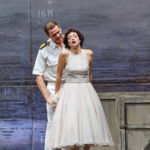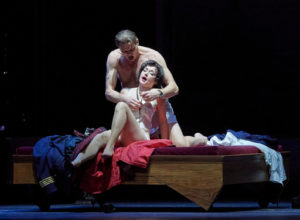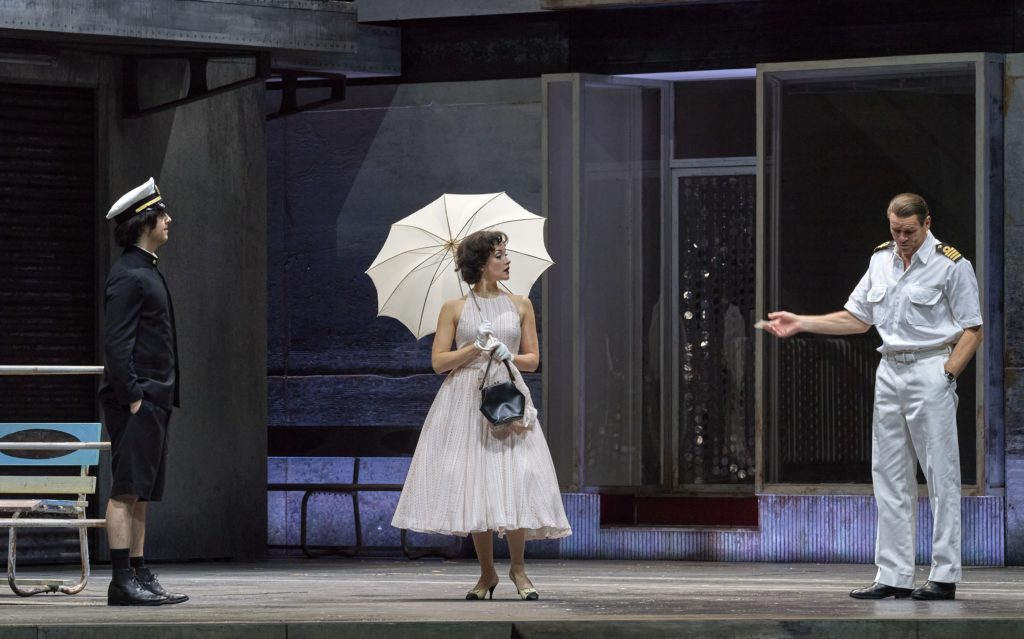Henze’s music, eschewing his complex pre-1980’s style, is infinitely fascinating on many levels. Exotically scored, using gamelan and multiple Japanese instruments, but brooding, ominous, with tremendous crescendos (reminiscent of Berg.)
In Jossi Wieler’s co-production, on a ship deck, enveloped in mist, over the rails, one boy brandishes a knife-blade; the music is dramatic, strident.
Fusako is making Noboru’s bed. There are oedipal resonnances. Josh Lovell’s Noboru, long-haired, 60’s Beatles style, is the moody teenager- she hopes he’ll be more reasonable. Fusako (Vera-Lotte Boecker) undoes her night gown, revealing a white slip.
Noboru observes her with a torch; she puts on high heels. Boys are clambering up the railings to get a better view of Fusako, eventually laid out on her bed. Lovell/Noburo tears around, frantic, tearful. His mother’s on the bed, in exotic-flowered top, legs splayed. Noboru enraged, head-bangs. Now changes into black; red Japanese script projects back-stage.
 Fusako appears French, but indeterminate, timeless. She’s a successful business woman with her own boutique. A woman playing many roles, singing in different registers, Boecker’s soprano has an astonishingly high range.
Fusako appears French, but indeterminate, timeless. She’s a successful business woman with her own boutique. A woman playing many roles, singing in different registers, Boecker’s soprano has an astonishingly high range.
So Fusako’s affair with with a seaman provokes Noboru’s jealous, subconsciously incestuous feelings; Hamlet-like resentment, masked as moral outrage.
‘Riuja, Mrs K, an honour to welcome you’… ‘This is my son Noboru’. The Captain has granted her wish to see around the ship. Boecker’s Fusako in white, matching the second Mate’s uniform. Those eyes …the eyes of a man searching all the way to the horizon. She swoons, must go outside to breathe; and kisses him. She invites him to dinner; he cannot accept. The neon sign of her boutique flashes.
Ryuji (baritone Bo Skovhus outstanding) sings of his first night at sea, dreaming of far-off places. Beyond the horizon.(Fusako observes in a maroon-red kimono.) Ryuji sings of his frustration: he was looking fo a world, but found only a pounding engine, that has no soul and no heart. She’s sorry- Why doesn’t he stay onshore?- Something keeps drawing him. Skovhus sings plaintively, his face perplexed, wistful. Angst-filled, like Berg’s Wozzek.
 He devours her physically, in a tempest of passion. Somehow Noboro- from high-up- is observing them- bare-chested, in pyjamas. While Ryuji is taking off his pants… She has a savings book.(20,000 yen.) -He has always paid. – ‘They can taste each other’s sweat’, as he strips off her clothes. The Act, carnal, but elegantly choreographed, she in red-silk gown.
He devours her physically, in a tempest of passion. Somehow Noboro- from high-up- is observing them- bare-chested, in pyjamas. While Ryuji is taking off his pants… She has a savings book.(20,000 yen.) -He has always paid. – ‘They can taste each other’s sweat’, as he strips off her clothes. The Act, carnal, but elegantly choreographed, she in red-silk gown.
The sailor belongs to me, the night belongs to me. Noboru appears spirit-like, observing the sailor smoking on the edge of the bed. The world is perfect, you are mine, all mine, sings Lovell. (The bed cleverly disappears backstage.)
Noboru rushes out to his mates. The sailor is a monster. He watched as he ripped her clothes off. – So that’s your hero! – He’s like all the rest. So Noboru is driven by repressed homosexuality, revenge,incomprehension.
The four youths sing of the order of the Universe…We recall Mishima’s right-wing ideology, “heroic military destiny”. Composed 1986-9, premiered Berlin 1990, but could the revival of Henze’s opera ever be more appropriate?
The atmosphere is one of steamy eroticism. Skovhus’s Ryuji would like to cool down- thinks, knows she loves him. But they set sail soon. So little time…The worst, he sings, is the endless time on deck. But now he has something to look forward to.
And impicitly homoerotic. Noboru appears. – What’s happened, his shirt is wet? Noboru strips down to his trunks. They both get under a shower? Noboru in red pants, Ryuji towels him down. Skovhus, short-cropped hair, muscular, like a navvy, is perfectly cast. And that baritone, powerful, but poetic, is able to express the fraught, existentialist crisis of the seaman who feels imprisoned, ironically no horizons, now seduced by the oriental businesswoman.(For five months he won’t see a kimono; he must write.) But Noboru wants him gone. Sad, but also proud. Lovell’s Noburo stands, face contorted, as Ryuji waves farewell.
Act 2 is sparsely scored. Summer,(Act1), has explosive contrasts, ‘Winter’, leaner, unfolds in ‘longer lyrical lines.’ Ryuji, in seaman’s cowl, pursues Fusako, Boecker in cute French designer clothes, camel coat, muffler. They sing of the icy cold ‘like a crystal, prophesying happiness for her’.-‘Will you marry me?’- What, just a simple sailor? (He offers his savings book, whether she marries him, or not.) She sees his ship’s sailing. He sings, he doesn’t belong any more.
Lovell’s Noboru, 1960’s mop-head, and striped tie- with his schoolmates- is like the anti-hero of Kubrick’s A Clockwork Orange. Noboru’s mother needs to change his nappy, they mock him. They sing, Winter winds blow, the ship leaves port. Ryuji is now helping his mother in her boutique! What a deflation of the heroic image they’d erected?
We see Fusako with Ryuji pushing a suit rail into her boutique. She’s sorry, Noboru’s father was a fine man, but that was eight years ago. Now she wants Noboru to call Ryuji father.
Now, wheeled onto the stage, the marital bed. She sees her son hidden- A shameful trick! He was watching us, saw everything! How long have you been doing that? But Ryuji won’t beat him. He will forgive him, his son. Jetzt ins Bett.
The boys stand in judgement, drawing up an indictment. ‘Things look damnably bad for the sailor.’ Henze’s opera without a chorus, (Gesprachgesang), is not only sung, but declaimed.
‘It is we who allowed things to be…The tree to rot, mothers to weep… The sailor has failed. He has betrayed the sea.’ Wie sollen es machen?

They plot. They need tools: knife, saws. Noboru is as white as a sheet. They have to do it: an act of retribution. They spray the stage boards with red paint.
Skovhus staggers, apparently drunk. The boutique’s locked. Fusako fumbles, from the inside, for a key, wearing a dress of bright flowers, swaying like a kabuki dancer.
In the plot, Ryuji’s lured into the mountains. We hear the staccato sounds of a machine gun. Hellish cacophany. In Henze’s sound scheme, the group are identified by piano and tuned percussion. Ryuji sings, maybe mistaken, the sea like a restless animal had waved to him. Skovhus sings movingly, melancholy, he’d dreamt of possessing the sea, its loneliness, its vastness. They, ‘sharks are circling idly.’
Noboru, who’d kept his cap, sings of the endless yearning. Someone strikes a hammer, the execution is under red spotlight, the stage doused in red. P.R.
The cast file onto the stage, solemn, silent, behind them the silver-grey structure of the ship. No applause when it premiered in lockdown (21.12.2020). But it was a triumph.
Photos: Bo Skovus (Ryuji), Vera-Lotte Boecker (Fusako);Stefan Astakhov, Martin Haessler, Kangmin Justin Kim, Erik van Heyningen, Josh Lovell; Featured image: Vera-Lotte Boecker
© Wiener Staatsoper/ Michael Pöhn


I have read your article, it is very informative and helpful for me.I admire the valuable information you offer in your articles. Thanks for posting it..
I am impressed. You are truly well informed and intelligent. You wrote something that people could understand and made the subject intriguing for everyone. Really, great blog you have got here.
I am incapable of reading articles online very often, but I’m happy I did today. It is very well written, and your points are well-expressed. I request you warmly, please, don’t ever stop writing.
I was reading some of your content on this website and I conceive this internet site is really informative ! Keep on putting up.
A very awesome blog post. We are really grateful for your blog post. You will find a lot of approaches after visiting your post.
Excellent website! I adore how it is easy on my eyes it is. I am questioning how I might be notified whenever a new post has been made. Looking for more new updates. Have a great day!
I’m animated reading your article. But should remark on some general things, the website style is perfect; the articles are great.